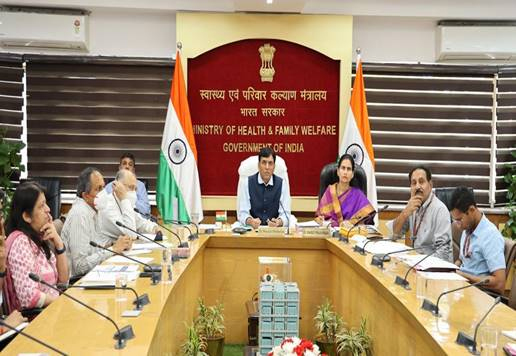- Centre and States need to continue working in Collaborative Spirit as was done during the previous surges: Dr. Mansukh Mandaviya
- “Five-Fold strategy of Test-Track-Treat-Vaccinate & Adherence to COVID Appropriate Behaviour continue to remain the policy for COVID management”
- State Health Ministers requested to review preparedness with District Administration and Public Health officials on 8th and 9th April
- States asked to conduct mock drills across all health facilities on 10th and 11th April; State Health Ministers urged to visit hospitals to review the drills
NE HEALTH BUREAU
NEW DELHI, APR 7
Amid rising cases of coronavirus, Union Health Minister Mansukh Mandaviya on Friday held a review meeting and advised states to stay alert and be prepared for COVID-19 management.
The meeting came as the number of fresh coronavirus cases in India reached 6,050 on Friday, which is the highest in 203 days since September last year.
“Centre and States need to continue working in collaborative spirit as was done during the previous surges for COVID-19 prevention and management,” Dr. Mansukh Mandaviya, Union Minister of Health and Family Welfare said.
Requested all the health ministers to review health facilities and infrastructure in view of the Covid in their respective States & also visit the hospital on April 10 & 11 when a COVID mock drill will be conducted across the country.
— Dr Mansukh Mandaviya (मोदी का परिवार) (@mansukhmandviya) April 7, 2023
The virtual meeting was held in the presence of Dr. Bharati Pravin Pawar, Union Minister of State for Health to review the public health preparedness for containment and management of COVID-19 and progress of national COVID-19 vaccination campaign in view of the recent upsurge in cases in some states.
In the meeting with state health ministers and principal and additional chief secretaries held virtually, Mandaviya stressed on identifying emergency hotspots by monitoring trends of influenza-like illness (ILI) and severe acute respiratory infection (SARI) cases, ramping up testing and vaccination and ensuring readiness of hospital infrastructure.
Along with enhancing genome sequencing and ramping up whole genome sequencing of positive samples, he also emphasised on creating awareness about following Covid-appropriate behaviour.
He also urged the state health ministers to conduct mock drills of all hospital infrastructure on April 10 and 11 and review the health preparedness with district administrations and health officials on April 8 and 9.
He also urged States to identify emerging hotspots by monitoring trends of ILI/SARI cases and sending sufficient samples for testing of COVID-19 and Influenza; and ramping up whole genome sequencing of positive samples.
It was observed that 23 states/UTs had average tests per million below the national average. Dr. Mandaviya said that irrespective of the new COVID variants, the five-fold strategy of ‘Test-Track-Treat-Vaccinate & Adherence to COVID Appropriate Behaviour’ continue to remain the tested strategy for COVID management. This would facilitate undertaking of appropriate public health measures, he said. States/UTs were also requested to expeditiously increase the rate of testing from the current rate of 100 tests per million, as on week ending 7th April, 2023. They were further advised to increase the share of RT-PCR in tests.
States/UTs were briefed that India has been witnessing a steady increase in COVID-19 cases with average daily cases rising to 4,188 in the week ending 07th April 2023 from 571 in the week ending 17th March 2023; and weekly positivity up to 3.02% in the week ending 07th April, 2023. However, 88,503 daily average cases have been reported globally in the same time, with the top five countries contributing 62.6% of global cases in the last one week.
States/UTs were further informed that currently WHO is closely tracking one variant of interest (VOI), XBB.1.5 and six other variants are under monitoring (BQ.1, BA.2.75, CH.1.1, XBB, XBF and XBB.1.16). It was highlighted that while Omicron and its sub-lineages continue to be the predominant variant, most of the assigned variants have little or no significant transmissibility, disease severity or immune escape. The prevalence of XBB.1.16 increased from 21.6% in Feb to 35.8% in March, 2023. However, no evidence of an increase in hospitalization or mortality has been reported.
Read also












